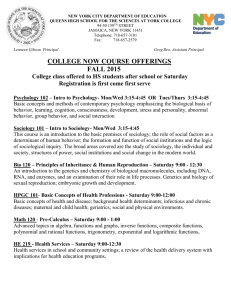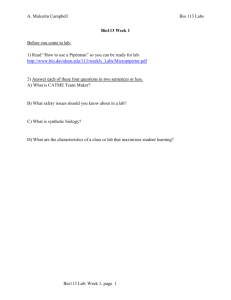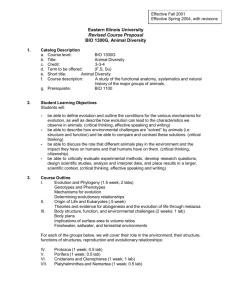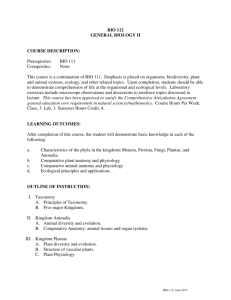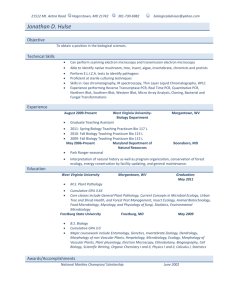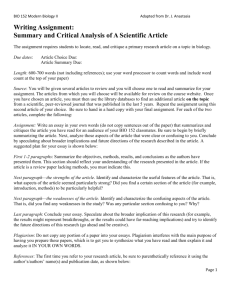BIO 100 info.pages
advertisement
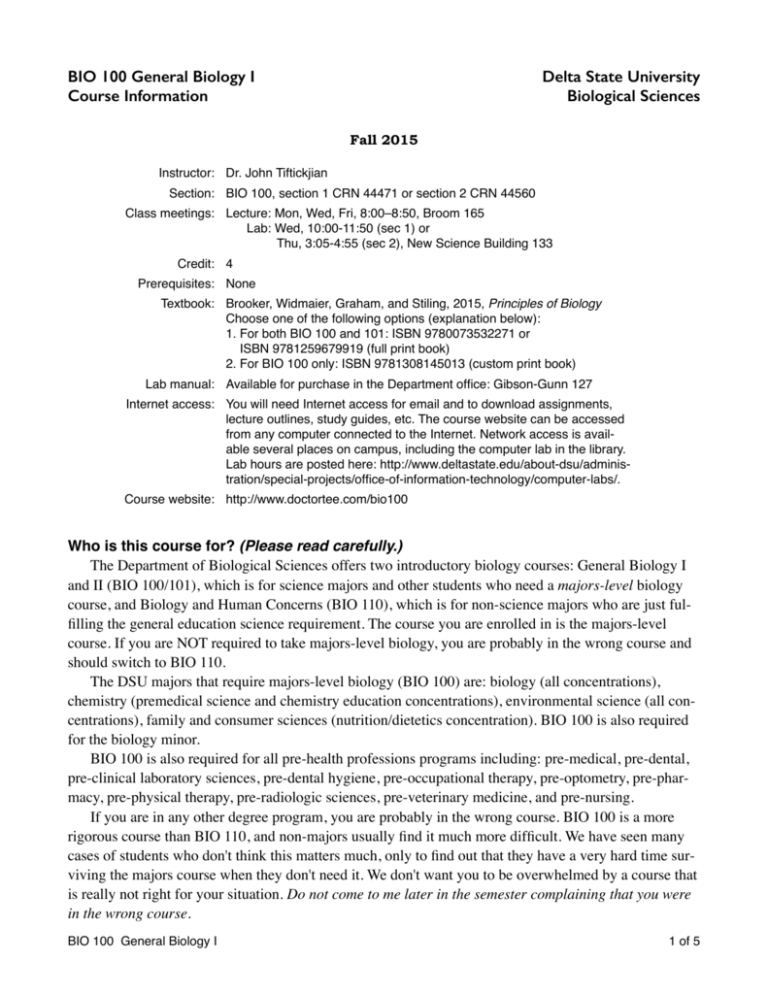
BIO 100 General Biology I Course Information Delta State University Biological Sciences Fall 2015 Instructor: Dr. John Tiftickjian Section: BIO 100, section 1 CRN 44471 or section 2 CRN 44560 Class meetings: Lecture: Mon, Wed, Fri, 8:00–8:50, Broom 165 Lab: Wed, 10:00-11:50 (sec 1) or Thu, 3:05-4:55 (sec 2), New Science Building 133 Credit: 4 Prerequisites: None Textbook: Brooker, Widmaier, Graham, and Stiling, 2015, Principles of Biology Choose one of the following options (explanation below): 1. For both BIO 100 and 101: ISBN 9780073532271 or ISBN 9781259679919 (full print book) 2. For BIO 100 only: ISBN 9781308145013 (custom print book) Lab manual: Available for purchase in the Department office: Gibson-Gunn 127 Internet access: You will need Internet access for email and to download assignments, lecture outlines, study guides, etc. The course website can be accessed from any computer connected to the Internet. Network access is available several places on campus, including the computer lab in the library. Lab hours are posted here: http://www.deltastate.edu/about-dsu/administration/special-projects/office-of-information-technology/computer-labs/. Course website: http://www.doctortee.com/bio100 Who is this course for? (Please read carefully.) The Department of Biological Sciences offers two introductory biology courses: General Biology I and II (BIO 100/101), which is for science majors and other students who need a majors-level biology course, and Biology and Human Concerns (BIO 110), which is for non-science majors who are just fulfilling the general education science requirement. The course you are enrolled in is the majors-level course. If you are NOT required to take majors-level biology, you are probably in the wrong course and should switch to BIO 110. The DSU majors that require majors-level biology (BIO 100) are: biology (all concentrations), chemistry (premedical science and chemistry education concentrations), environmental science (all concentrations), family and consumer sciences (nutrition/dietetics concentration). BIO 100 is also required for the biology minor. BIO 100 is also required for all pre-health professions programs including: pre-medical, pre-dental, pre-clinical laboratory sciences, pre-dental hygiene, pre-occupational therapy, pre-optometry, pre-pharmacy, pre-physical therapy, pre-radiologic sciences, pre-veterinary medicine, and pre-nursing. If you are in any other degree program, you are probably in the wrong course. BIO 100 is a more rigorous course than BIO 110, and non-majors usually find it much more difficult. We have seen many cases of students who don't think this matters much, only to find out that they have a very hard time surviving the majors course when they don't need it. We don't want you to be overwhelmed by a course that is really not right for your situation. Do not come to me later in the semester complaining that you were in the wrong course. BIO 100 General Biology I 1 of 5 General course description BIO 100 is the first course of the two-semester General Biology sequence. Most students will go on to BIO 101 after completing BIO 100. BIO 100 is the foundation for all succeeding biology courses at DSU, making it one of the most important courses taken by biology majors. This course also gives those who are considering a career in the sciences or heath professions a general look at the various branches of biology so that they might better choose areas of concentration for further study. BIO 100 starts with an introduction to what life is, and how it is studied. We then cover introductory ecology and how organisms are classified. Covered next are the building blocks of life-molecules and cells. We then go on to such topics as metabolism, transport, respiration, and photosynthesis. Although we will cover some of the general features of plants and animals, we will emphasize features that are common to all organisms. By the end of the semester, we should have a good idea of what biology is and appreciate the importance of studying living organisms. Course objectives After completing this course, students should be able to: • analyze biological data, develop hypotheses, interpret experimental results, and draw conclusions. • analyze biological phenomena by considering the reasons behind the structures and processes that define an organism. • think beyond just knowing names of molecules, cells, organs, and the functions they perform by developing an understanding of why structures and processes make sense for survival. • begin to appreciate that there are millions of species, from the simplest bacteria to the largest plants and animals, and realizing that this species diversity is part of what defines life. • understand that there are diverse adaptations for survival. All species must solve problems to survive: obtain energy, water, and nutrients; grow; and reproduce. These problems are different in different environments, and organisms have evolved to solve these problems in different ways. • understand that all organisms are the products of natural selection. Every biological phenomenon must be considered in light of the process of evolution. • appreciate that biological systems are complex and that science recognizes a hierarchy of organization: atoms, molecules, cells, organisms, populations, ecosystems, biosphere. • describe how basic chemical and physical principles apply to cell structure, metabolism, reproduction, heredity, and evolution. • achieve competency in the use of the basic laboratory tools of biology including measuring equipment, the light microscope, and technology required to analyze experimental data. The second semester of the sequence (BIO 101) covers evolution; classification of prokaryotes, protists, fungi, plants, and animals; plant form and function; and animal form and function. Expected preparation Because this is the first course in biology for science majors, it has no college-level prerequisites. You have had at least one course in biology in high school, but I won't expect you to remember all you learned in those courses. High school courses vary depending on the school you attended and the teachers you had. Some of you will know more to start with than others will, but most of you will find the topics we cover are at least basically familiar. Don't worry about being unprepared! I will not assume that you know a lot now, but I will expect you to know quite a bit when we are done. BIO 100 General Biology I 2 of 5 The textbook There are two versions of the textbook. If you are a biology major, or in any program which requires both semesters of the General Biology (both BIO 100 and BIO 101), you need the full Principles of Biology book. Don't panic at the size of the book! It will be used for the whole 2-semester course. We cover about half of it in BIO 100 (But that will be plenty of information!) and the rest in BIO 101. If you prefer to use an eBook rather than the print version, that is available too. If you are in a program which requires only one semester of general biology (pre-nursing and some non-degree pre-health programs), you should purchase the custom book. It contains only the chapters covered in BIO 100. This will save you money over the full book, because you don’t have to pay for chapters that are covered in BIO 101. Check carefully when you purchase your book to be sure you are getting the right one. At the top of this syllabus you will find the correct ISBN for the book you need. Check the ISBN carefully. The full book comes in several versions. One of them includes “ConnectPlus.” We WILL NOT be using Connect in Dr. T’s sections this semester, so you don’t have to purchase that version. But if you plan to take BIO 101 in the future, your instructor may use it, so it might be worth it to invest in that version. As far as this semester is concerned, you just need to book itself. How you get the book is up to you. You can buy the regular book, eBook (if available), or rent the book. As long as you have access to a copy for the reading assignments, you will be fine. We will follow the text closely, and there will be regular reading assignments for every lecture, so you must have a copy. Watch reading assignments carefully to make sure you are reading the correct sections in the correct order. Some topics are covered in a different order than the book covers them. The book is available in the campus bookstore for purchase. There are other sources you might want to check for the best price. Several online book sellers carry the book, both new and used. If you consider buying online, remember to consider shipping costs and how soon the book will get to you. If it takes longer than a couple of days, you may get behind on your reading assignments. The faculty who teach BIO 100 at Delta State have compiled a set of laboratory exercises specifically for this course. You will be able to purchase this lab manual for a very minimal fee from the Department of Biological Sciences office (Gibson-Gunn 127) shortly after the beginning of the semester. Lecture format Lecture format for this course is pretty traditional for an introductory science course. We will discuss concepts that you read about in the textbook. Although most of this will be me talking, be prepared to answer questions that I may ask of the class and do some class discussion where the topic is suited to that approach. I will expect that you have read the textbook assignment before each lecture. I will present an outline of the lecture on the projection screen that we will work from. This is not a slide show format, like you might be familiar with in other classes, but just a guide to work from for more in-depth discussion. All lecture outlines will be available on the course web site after class, so you don’t need to copy everything down that you see on the screen. You can go online later to print that information if you want to. I try to include illustrations, diagrams, micrographs, etc. wherever possible to make the lecture a more visual experience. BIO 100 General Biology I 3 of 5 Laboratory format Labs meet once per week. About 1/2 the class is registered in one lab section, and about 1/2 in the other. Make sure you know what day and time your lab section meets. I will be your instructor for both lecture and lab. We will talk about exactly how labs will work at the first lab meeting. Unlike some chemistry and physics courses, the lab is not a separate course. You won't get separate lecture and lab grades. Grades for lab assignments and lecture assignments will be combined to give you a single letter grade. Course web site The URL for the course web site is given above. Here you will find class news, assignments, lecture outlines, study guides, and other information that will be useful. This is by no means an “online” course, but should be considered “Web-enhanced.” You are only required to use the website to access assignments, but it is strongly recommended that you make use of the other materials posted there. You will find some materials here that may not be in the textbook or covered completely in lecture. All the online content is designed to enhance the course and help to improve your grade. You should check the site frequently as it is constantly changing. The most important page is the course outline that shows an up-todate schedule of lecture and lab topics, reading assignments, and assignments. Assignments and testing Daily quizzes. [Approximately 50 points] There will be short quizzes each day at the beginning of the lecture period. A typical quiz will take about 5 minutes. Material for quizzes will come from the day’s reading assignment and recent lectures. Laboratory. [Approximately 100-150 points] Some of the lab exercises will have associated lab reports that will be turned in and there may be a few lab quizzes. Exams. [300 points] There will be three major exams during the semester. Each exam will cover material presented in lecture, textbook readings, and lab work. Questions will be both objective (mostly multiple choice) and short essay questions. I will give you more specific information about exams as we get close to the first one. Planned exam dates are shown on the course outline but are subject to change. You will find some example exam questions on the web site. Other assignments. [0-50 points] There will occasionally be additional written assignments. Each of these will carry a certain point value. The total will depend on exactly how many assignments are made. Final exam. [150 points] The final exam is comprehensive. That is, it will cover information taken from the whole semester. However, questions on older material will be more general than on earlier exams. Those questions should not be difficult as long as you have reviewed the major concepts covered throughout the semester. Approximately 2/3 of the final will come from material covered after the 3rd exam. The format of the final is similar to that of the lecture exams, but will of course be a bit longer. BIO 100 General Biology I 4 of 5 Grading Assignment Points Percent grade Letter grade Daily quizzes ~50 90 -100 A Lecture exams 300 80-89 B 100-150 70-79 C Other assignments ~50 60-69 D Final exam 150 below 60 F Total points 650-700 Laboratory work The point total is only approximate and may change somewhat. Because your grade is based on total points, it is easy to determine your grade at any time. Just add up the points you have at any moment in time, and divide this total by how many point are possible at that time. Checking your grades You will be able to check your grade online through a secure web page. You will log in with a unique password so no one else will be able to see your grades. You will receive your password by email. This web page is independent of the Blackboard system used by Delta State. The login ID and password you might be using for another course through Blackboard will not work for Dr. T's courses. Other course policies See the course policies handout for additional information on attendance, grading, dropping the course, etc. BIO 100 General Biology I 5 of 5 BIO 100 Course Schedule Date Topics Readings Assignments Introduction Welcome Welcome message Mon 8/17/2015 Course policies Review syllabus Wed 8/19/2015 Course introduction LAB: Introduction and concepts pre-test Biology content test Fri 8/21/2015 Science skills test TIPS assessment Mon 8/24/2015 What is life Ch 1: 1-12 Introduction study guide Wed 8/26/2015 What is biology LAB: Scientific method I Ch 1: 12-17 Lab 1: 5-11 Introduction study guide Ecology and systematics Fri 8/28/2015 Biomes Ch 43: 886-900 Ecology study guide Mon 8/31/2015 Population ecology Ch 44: 902-919 Ecology study guide Wed 9/2/2015 Population ecology LAB: Scientific method II LAB: Measurement Ch 44: 902-919 Lab: 1: 11 Lab appendix 1: 80-88 Ecology study guide Fri 9/4/2015 Communities/ecosystems Ch 46: 935-952 Ecology study guide Mon 9/7/2015 LABOR DAY (no class) Wed 9/9/2015 Ecosystems LAB: Statistics LAB: Scientific method III (report due 9/25) Ch 46: 935-952 Lab appendix 2: 89-99 Lab 1: 12-20 Ecology study guide Fri 9/11/2015 Taxonomy and systematics Ch 21: 426-440 Taxonomy study guide Mon 9/14/2015 Taxonomy and systematics Ch 21: 426-440 Taxonomy study guide Mon 9/14/2015 Tree of life assignment Due Friday, 9/25 Assignment instructions Wed 9/16/2015 Basic chemistry LAB: Taxonomy Ch 2: 18-27 Lab: 2: 21-30 Chemistry study guide Fri 9/18/2015 EXAM 1 Through taxonomy Review for the exam Mon 9/21/2015 Basic chemistry Organic molecules Ch 2: 28-34 Ch 3: 35-41 Chemistry study guide Organic chem study guide Wed 9/23/2015 Organic molecules LAB: Biological molecules Ch 3: 41-53 Lab 3: 31-40 Organic chem study guide Fri 9/25/2015 Organic molecules Ch 3: 41-53 Organic chem study guide Metric system study guide Report instructions Chemistry of life Cell structure and function Mon 9/28/2015 General features of cells Ch 4: 54-68 Cells study guide Wed 9/30/2015 General features of cells LAB: Microscopy Ch 4: 68-86 Lab 4: 41-52 Cells study guide Microscopy information Fri 10/2/2015 The plasma membrane Ch 5: 87-106 Membrane study guide Mon 10/5/2015 The plasma membrane Ch 5: 87-106 Membrane study guide Schedule for BIO 100 August 12, 2015 Date Topics Readings Assignments Metabolism and cell interactions Wed 10/7/2015 Energy and enzymes NO LAB Ch 6: 111-119 Enzymes study guide Thu 10/8/2015 FALL BREAK (10/8-10/9) Mon 10/12/2015 Energy and enzymes Ch 6: 111-119 Enzymes study guide Wed 10/14/2015 EXAM 2 LAB: Cell structure Through membranes Lab 5: 53-58 Review for the exam Cell lab info Fri 10/16/2015 Respiration Ch 6: 119-136 Respiration study guide Mon 10/19/2015 Respiration Ch 6: 119-136 Respiration study guide Wed 10/21/2015 Photosynthesis, light reactions LAB: Osmosis Ch 7: 137-143 Lab 6: 59-62 Photosynthesis study guide Fri 10/23/2015 Photosynthesis, light reactions Ch 7: 143-147 Photosynthesis study guide Mon 10/26/2015 Photosynthesis, dark reactions Ch 7: 147-155 Genes and chromosomes Mon 10/26/2015 Pigment assignment Due Monday, 11/2 Assignment instructions Wed 10/28/2015 Nucleic acid structure LAB: Respiration Ch 9: 172-182 Lab 7 Nucleic acid study guide Fri 10/30/2015 DNA replication Ch 9: 182-184 Nucleic acid study guide Mon 11/2/2015 EXAM 3 Through photosynthesis Review for exam Wed 11/4/2015 Gene expression LAB: Photosynthesis Ch 10: 194-213 Lab 8 Gene expression study guide Fri 11/6/2015 Chromosomes Ch 13: 252-262 Chromosomes study guide Mon 11/9/2015 Cell cycle and mitosis Ch 13: 252-262 Chromosomes study guide Wed 11/11/2015 Meiosis LAB: DNA isolation Ch 13: 262-268 Lab 9 Meiosis study guide Fri 11/13/2015 Basics of inheritance Ch 14: 275-281 Genetics study guide Mon 11/16/2015 Basics of inheritance Ch 14: 281-287 Genetics study guide Wed 11/18/2015 Basics of inheritance LAB: DNA analysis Ch 14: 281-287 Lab 10 Genetics study guide Fri 11/20/2015 Genetics problems discussion Mon 11/23/2015 THANKSGIVING HOLIDAYS ( 11/23-11/227) Mon 11/30/2015 Genetics problems discussion Genetics study guide Wed 12/2/2015 Review LAB: Biology concepts - post-test Biology content test Fri 12/4/2015 Science skills - post test TIPS assessment Wed 12/9/2015 FINAL EXAM 8:00 AM Inheritance Schedule for BIO 100 Genetics study guide Final exam topics Prepare for final exam August 12, 2015

